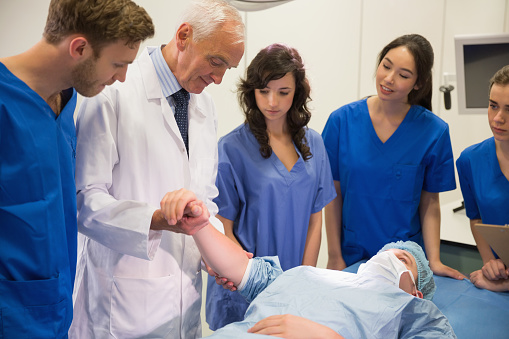
So after the long application process and months of waiting you have been accepted onto your medical course. You’re probably feeling a mixture of excitement, nervousness and uncertainty about what to expect when you start. All first year medical courses will have differences in their content and structure, but here I have laid out some of the common things experienced by all first year medics.
Read more about how to make the most of the summer before med school>>
read our top tips1. Clinical anatomy
A significant component of all first year medical courses is anatomy. You will learn the anatomy of the different systems of the body. These are broken down by head and neck, limbs, circulatory, respiratory, gastrointestinal and reproductive systems.
Anatomy in medicine is different to an anatomy degree. In medicine there is more focus on clinically relevant anatomy rather than all of the minute anatomical details. An example is that instead of learning every single nerve in the body, you will learn the most clinically important ones such as those that are responsible for reflexes, vision, breathing, hearing, sensation and movement.
Some students love anatomy and others are more indifferent, but that’s okay. It’s important to keep in mind that medicine is a massive subject and you will enjoy certain parts more than others. The key is to make sure you cover everything in some detail instead of only studying the parts that you enjoy.
Read How Does Studying Medicine Differ to A-Levels?>>
2. The volume and pace of work
We are all told that medical school is tough, but you only really appreciate that once you get here. Many students will tell you that it isn’t so much the concepts that are difficult, rather it is the sheer amount of volume that you are expected to absorb in such as small amount of time.
One of our lecturers remarked that the first year is like learning a new language and culture. After finishing my first year I couldn’t agree more. You will learn to make time for studying whilst managing the competing interests of maintaining your hobbies, keeping fit, socialising and your day-to-day housekeeping.
Some students create their own timetable in which they dedicate slots to study, whereas others try to fit studying around their other commitments. You will find a way that works best for you but the important thing is to make sure to cover all of the required learning aims by the time the module is completed.
There is very little time to revisit previous modules so keeping on top of your workload is essential. Having said that, you will be amazed at the amount of stuff you remember and it is particularly rewarding at the end of the year when it all fits together and makes sense!
Read our tips on managing a med school workload>>
Wondering which medical specialty would best suit you? Take the quiz!
Or try our other quizzes:
3. Professional expectations
It comes as a surprise to many first year medical students that the level of professional expectations placed upon them are greater than those placed on other students. It isn’t uncommon for students to be confused about what “professionalism” means.
In a nutshell, it is a set of values, behaviours and expectations that underlie public trust in the medical profession. As medical students you will be exposed to members of the public. They expect you to conduct yourself with integrity, maintain confidentiality, be dressed appropriately and act compassionately. In exchange, you will be given the privilege of trust and exposure to the most intimate aspects of patients’ lives and their needs.
In a broader sense you will also need to be punctual and organised – the learning opportunities for medical students take a lot of effort to arrange and it is considered highly unprofessional to consistently be late.
The final thing to mention is professionalism on social media. This is something that is very topical at the moment so just be aware that what you put online is not private and can be seen by patients, staff and your colleagues.
It takes time to adjust to these high standards of conduct but the rewards are immense. You learn so much from meeting patients and hearing their stories and these experiences shape you to be a better and more conscientious medical student.
Read things you might not know about studying a PBL course>>
Words: Asaad Qadri
